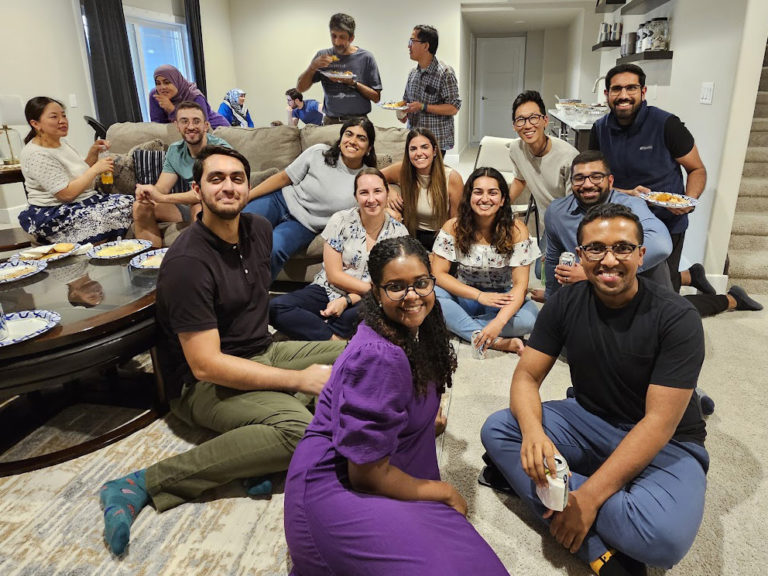
A workforce that reflects the patients we serve and embraces diversity of all forms is crucial to the well-being of our community and medical program. We strive to be part of the long-overdue and necessary changes to the medical profession. As we work to transform our field into one that is worthy of the trust of our community and all who work in healthcare, we support a culture of:
- Creating an increasingly diverse, inclusive, and welcoming environment.
- Critiquing policies, evaluation procedures, and educational offerings through a lens of equity, inclusion, belonging, and justice.
- Advancing critical consciousness including sociopolitical awareness, cognizance of power dynamics, and historical knowledge.
- Demonstrating accountability, both in the moment and with transparency of past abuses.
- Challenging the status quo.
- Embodying a spirit of humility, respect, and genuineness that values listening and serving above pushing our own agendas.
Education for Change
Our pediatric residents participate in a longitudinal curriculum on social justice, encompassing approximately 30 hours of formal content during conferences and additional content integrated into rotations. Learn more about our curriculum below!
This is an accordion element with a series of buttons that open and close related content panels.
Overview
Racism is a critical social determinant of health. 1,3,4 Other forms of oppression, meaning the “interlocking forces that create and sustain injustice,”5 include forces such as sexism, ableism, heterosexism, xenophobia, weight bias, and gender normativity, among others. Social justice “refers to reconstructing society in accordance with principles of equity, recognition and inclusion… [and] involves eliminating injustice created when differences are sorted and ranked in a hierarchy that unequally confers power, social, and economic advantages, and institutional and cultural validity to social groups based on their location in that hierarchy.”5 Achieving social justice is crucial to achieving health equity, and requires disruption to many of our society’s current systems—including healthcare.
Resources were cultivated from a variety of sources—both within and outside of the medical field—including the fields of education, social work, psychology, as well as national organizations such as the National Museum of African American History and Culture, California Newsreel, Just Health Action, the National Equity Project, the Association of Pediatric Program Directors, and more. Sessions are heavily discussion-based. In addition to sessions for the residents, all of our program leadership, Department Chair, and a number of other faculty members have participated in the curriculum and we continue to disseminate the content throughout the Department. While the ultimate goal is to move toward a more just future, including achieving health equity for all patients and achieving a sense of belonging for all who work in our healthcare system, as a more proximate goal we focused this curriculum’s objectives on shifting learners’ knowledge, skills and attitudes.
Objectives
- Analyze how the history of racism and other forms of oppression impact our current state of health (in)equity, healthcare, and academic medicine.
- Examine the way systems of power and systems of oppression are at work in our daily lives, both within and outside of professional roles.
- Assess one’s own identity and biases, and implement strategies to reduce the impact of these biases on interpersonal interactions while maintaining self-compassion.
- Intervene when witnessing or experiencing racism and other forms of oppression; recognize responsibilities of witnesses and rights (including the right to do nothing) for those experiencing aggression.
- Engage others in conversation and action related to social justice.
- Appreciate the benefits to ALL people, including both those in power and those experiencing oppression, of working for social justice.
- Demonstrate the abilities to sit with discomfort and to cause disruption as necessary steps toward a more equitable future.
- Appraise one’s own unique talents and positions of power, and use this to plan individual, actionable steps to promoting a more just future.
Integration
Formal content is delivered primarily during our block education time, PEARL, and some Morning Report sessions. Interns receive a more intensive series throughout the course of their first year here, which we build upon as a whole program together in sessions both during intern year and in subsequent years of residency. Our hope is that ultimately all learning, research and care will incorporate a social justice perspective. As such, these topics are increasingly interwoven into discussions and learning that takes place at other times. Additionally, residents participating in the Global Health and PUBLISH pathways will examine issues related to these areas of focus more deeply.
Participation and Curricular Responsiveness
All residents are encouraged to attend. Residents who may find the content traumatizing, redundant, or unnecessary because of their lived experiences and identity are welcome to opt out. Residents who are uncomfortable for other reasons, and particularly those who hold identities that put them primarily in positions of power or privilege, are encouraged to stay. Regardless, no explanation is required of anyone who opts out. As we strive to create an inclusive and responsive environment, we provide multiple mechanisms for feedback on the curriculum and environment.
Participant Quotes
- “I really enjoyed realizing how many people actually care about these issues and having a space to talk about this. I felt like we were a team going through the curriculum together. I also really appreciated the faculty perspectives.”
- “This curriculum challenged me to think and talk about things that were uncomfortable – thoughts/discussions I probably would have strayed from if not part of a mandatory curriculum.”
- “The best part was getting to hear from other about their experiences, whether similar or different to mine. Sometimes things people said were ideas I have never thought about. It made me really think about my own actions or scenarios I have been in.”
- “Learning more about the history of race and racism was the best part.”
- “I feel so much more confident in my abilities to talk about social injustices and to further identify the endless areas that I need to learn more about. This curriculum gave me a great platform that I will continue to build and work on going forward as I progress in my career.”
- “I found it empowering to share my experiences with racism for the first time with people outside of my family.”
- “Change is slow but I’ve come away with strategies to meet people where they are in hopes of making small progress continually over time.”
Departmental and Institutional Initiatives
Inclusion, Diversity, Equity, Accessibility and Anti-Racism (IDEAA) Committee
This departmental committee consists of several sub committees dedicated to work in various areas including education, research, and Health Equity Rounds. Residents are welcome to join. Activities over the past two years have included:
- Department-wide participation in trainings related to microaggression response, consideration of IDEAA in research, LGBTQIA+ and weight-bias specific trainings
- Division level educational support
- Inclusion of IDEAA related work in faculty promotion and annual review discussions
- Ongoing re-development in equitable recruitment, promotion, and retention approaches.
- Administration of a department-wide DEI needs assessment to identify current gaps in DEI education and attitudes surrounding DEI topics.
Director of Diversity, Equity, and Inclusion
When the Department of Pediatrics embarked on its strategic planning process in the summer of 2018, faculty and staff agreed that creating a culture where people and ideas thrived was a top priority. This process led to the creation of a Diversity, Equity, and Inclusion (DEI) strategic planning workgroup and later an Anti-Racism Taskforce. The Taskforce, which sought to heighten the department’s focus on anti-racism in action, also identified a point of advocacy: the need for a dedicated director position to lead DEI and anti-racism efforts. Mary Ehlenbach, MD, was selected as the department’s inaugural Director of DEI.
UW Health Office of Diversity and Equity Transformation
UW Health is committed to creating an inclusive environment for faculty, staff, learners and patients. Providers and others who work at UW Health are NOT expected to tolerate oppressive, offensive or aggressive behavior or language from patients or colleagues. Unfortunately, we recognize that many residents with marginalized identities may experience microaggressions throughout the course of our careers. During orientation, we will review the UW Health policy. Residents will receive tools to report and/or respond to any micro- or macro-aggressions, either when witnessing these as an ally (encouraged/expected!) or if personally experiencing these events (at your discretion).
Advocacy
We recognize that equity, advocacy, and wellness are closely inter-related. To that end, we highlight advocacy and provider well-being as key parts of our approach to the residency program and our department. Learn more about advocacy in the Department of Pediatrics.
Affinity and Employee Resource Groups
Affinity and Employee Resource Groups (ERGs) are groups of individuals that share a common identity or interest. Among other things, they are intended to provide opportunities for employee networking, professional and personal development activities, and improve cultural understanding. We are proud to support Affinity groups on departmental and institutional levels. As part of Education for CHANGE, we also incorporate the use of Affinity caucuses. Learn more about our Affinity and ERGs below.



